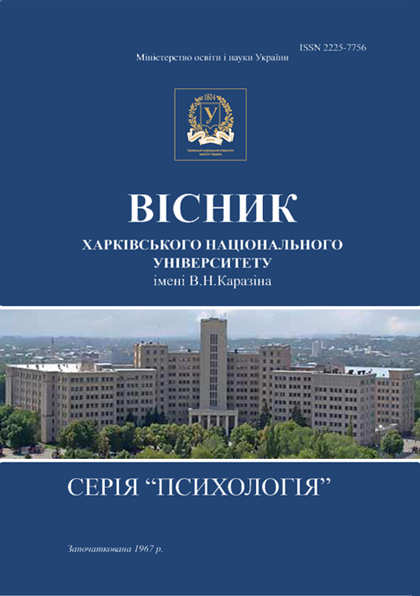TRUST AND EMOTIONAL INTELLIGENCE AS PREDICTORS OF subjective WELLBEING OF STUDENTS
Abstract
The article proposes theoretical analysis of the trust and emotional intelligence as the predictors of
subjective well-being of an individual. It includes the results of an empirical study in which 54 students of
the Kharkiv National University by Karazin V.N. took part. The age of these students was from 17 to 23 years old. The hypothesis of our empirical study was that the trust as a fundamental psychological setting of a person, mediates the influence of emotional intelligence on subjective well-being of students. In this study the following methods were used: “Scale of Subjective Well-Being” G. Perrudet-Badoux for measuring the emotional component of subjective well-being and “Scale of Satisfaction with Life” by E. Diner for measuring the cognitive component of subjective well-being. To study an emotional intelligence we used the questionnaire of emotional intelligence N.Holl which determines the indicators of emotional awareness, control of emotions, self-motivation, empathy and recognition of emotions of other people. To determine the level of the person’s trust we use the method of studying the trust/distrust to the world, to other people and to himself that was developed by B. Kupreichenko. The effect of the trust as a mediator between an emotional intelligence and subjective well-being is the most pronounced in relation with the cognitive component. As to the emotional component, the role of general trust as a mediator relates only to the ability of managing others’ emotions and an emotional awareness. The generalized structural model of interrelationships between trust, emotional intelligence and subjective well-being is proposed.
Downloads
References
/ Дубовик Юлия Борисовна. – Москва, 2012. – 230 с.
Ильин Е. П. Психология доверия / Е.П.Ильин. – СПб.: Питер, 2013. – С. 273–274.
Кряж І. В. Довіра й емоційний інтелект як предиктори особистісного благополуччя студентів-психологів / І. В. Кряж, Н. В. Гранкіна-Сазонова // Психологія: реальність і перспективи. – 2017. – Вип.
8. – С. 137-143.
Лэнгле А. Фундаментальные мотивации экзистенции как действенная структура экзистенциально-аналитической терапии // Экзистенциальный анализ. Бюллетень. – Москва, 2009. – №1. – С. 9–31.
Орме Г. Эмоциональное мышление как инструмент достижения успеха / Г. Орме. – М: КСП+,
2003. – С. 20–27.
Осин Е. Н., Леонтьев Д. А. Апробация русскоязычных версий двух шкал экспресс-оценки
субъективного благополучия // Материалы III Всероссийского социологического конгресса. М.:
Институт социологии РАН, 2008.
Сергиенко Е.А. Тест Дж. Мэйера, П. Сэловея и Д. Карузо Эмоциональный интеллект MSCEITv. 2.0. Руководство / Е.А.Сергиенко, И.И.Ветрова. – М.: Изд-во «Институт психологии РАН», 2010. – 176 с.
Телесная психотерапия. Бодинамика: [пер. с англ.] / Ред.-сост. В. Б. Березкина-Орлова. – М. АСТ: АСТ Москва, 2010. – 409 с.
Шпак М.М. Емоційний інтелект як особистісний ресурс забеспечення психологічного благополуччя молодших школярів // Наука и освіта. – 2016. – №5. – С. 266-270.
Эриксон Э. Г. Детство и общество / пер. [с англ.] и науч. ред. А. А. Алексеев. — СПб.:Летний сад, 2000.
Bar-On R. The impact of emotional intelligence on subjective well-being / Reuven Bar-On // Perspectives in Education. – 2005. – 23 (2). – Р.41-61.
Burrus J. Emotional Intelligence Relates to Well-Being: Evidence from the Situational Judgment Test of Emotional Management / Burrus J., Betancourt A., Holtzman S., Minsky J., MacCann C., Roberts R.D. // Applied Psychology: Health and Well-Being. – 2012. – 4(2). – Р.151-166.
Carmeli A. The relationship between emotional intelligence and psychological well-being / Abraham Carmeli, Meyrav Yitzhak-Halevy, Jacob Weisberg // Journal of Managerial Psychology – 2009 – Vol. 24 Iss: 1. – P.66 – 78.
Diener E. Subjective well-being / E. Diener // Psychological Bulletin. – 1984. – 95(3). –Р.542-575. http://dx.doi.org/10.1037/0033-2909.95.3.542.
Harminder К. G. Emotional intelligence – an important determinant of well-being and employee behaviour: a study on young professionals / Harminder Кaur Gujral, Mehak Aneja // International Journal of Management, IT and Engineering. – 2012. – V.2 (8). – P. 322-339
Helliwell J. F. Trust and wellbeing / John F. Helliwell, Shun Wang // International Journal of Wellbeing. – 2011. – 1(1) – P.42-78.
Shaheen S. Emotional Intelligence In Relation To Psychological Well-Being among Students / S. Shaheen, H. Shaheen // International Journal of Indian Psychology. – 2016. – Volume 3, Issue 4. – No. 63.
Steiger J.H. Моделирование структурными уравнениями: Statistica. Глава 11. – StatSoft, 1995. – С. 3535–3698.
Zeidner M. The Emotional Intelligence, Health, and Well-Being Nexus: What Have We Learned and What Have We Missed? / Moshe Zeidner, Gerald Matthews, Richard D. Roberts // Applied Psychology: Health and Well-Being –2012. – Volume 4, Issue 1. – P. 1–30.




